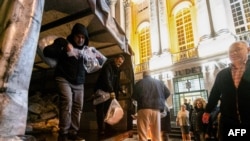Romanians returned to the polls on Sunday to elect a new Parliament, with the far right tipped to win, potentially heralding a shift in the foreign policy of the NATO country bordering Ukraine.
The parliamentary poll comes at a time of political turmoil, sparked when a top court ordered a recount of the first round of the separate presidential election on November 24.
The presidential ballot was won by Calin Georgescu, a little-known far-right admirer of Russian President Vladimir Putin. A runoff in that poll is slated for December 8.
Despite accusations of Russian influence and alleged interference via TikTok, Sunday's parliamentary elections went ahead as planned.
Polling stations opened at 7 a.m. (0500 GMT) and will close at 9 p.m., with an exit poll due to be published shortly afterward.
The first official results are expected later in the evening.
Florentina Noja, a 55-year-old engineer, said she voted for "some young" candidates she said were "a little less indoctrinated by the current system."
"We need to try to start afresh," she told AFP in Bucharest.
She added she hoped for "more transparency and less corruption," while voicing concern that Romania might turn away from its pro-European path.
Fragmented parliament
Romania's political landscape has been shaped by two major parties for the past three decades.
But analysts predict a fragmented Parliament will emerge from Sunday's vote, influencing the chances of forming a future government.
Polls show that several far-right parties -- which oppose sending aid to Ukraine -- are predicted to claim a combined share of the vote of more than 30%.
The country of 19 million people has so far resisted rising nationalism in the region.
But experts say it now faces an unprecedented situation since the fall of communism in 1989, as anger over soaring inflation and fears of being dragged into Russia's war in neighboring Ukraine have mounted.
George Sorin, a 45-year-old economist in Bucharest, told AFP he hoped the far right would perform well.
He said he believed the outgoing Parliament had mostly served the interests of Ukraine by sending aid and had prioritized the European Union over "national interests."
The far-right parties include the AUR, which is leading the latest polls and whose leader, George Simion, won nearly 14% of the presidential vote.
There is also the extreme-right SOS Romania party led by firebrand Diana Sosoaca, and the recently founded Party of Young People (POT), which could reach the 5% threshold to enter Parliament.
In the opposing pro-EU camp, the centrist USR hopes to do well after their leader, Elena Lasconi, placed second in the presidential ballot.
'Order or chaos'
The ruling Social Democrats (PSD) and the National Liberal Party (PNL) suffered a big defeat in last week's presidential election.
Outgoing Prime Minister Marcel Ciolacu said after voting that Sunday's parliamentary ballot was a choice "between stability and chaos."
Outgoing pro-EU President Klaus Iohannis said the vote was "crucial" and would determine Romania's future -- whether it will "remain a country of freedom and openness or collapse into toxic isolation and a dark past."
The parliamentary election takes place at a delicate time, with the top court's order to recount the ballots of the first round of last week's presidential election causing widespread confusion.
After casting his vote in the city of Foscani, AUR leader Simion alleged some people were "trying to repeat the [presidential] election to get the outcome they desire."
"Last Sunday, the Romanian people spoke," he said, insisting the result of the presidential vote should be respected.
According to Septimius Parvu of the Expert Forum think tank, the recount order by Romania's Constitutional Court had "many negative effects," including undermining confidence in Romanian institutions.
"We've already recounted votes in Romania in the past but not millions of votes, with parliamentary elections in the middle of it all," said Parvu.
The top court's decision is likely to boost the far right, he said.
"No decision made during this crucial period should limit the right of Romanians to vote freely nor further put at risk the credibility of the election process," the U.S. Embassy in Romania said.




